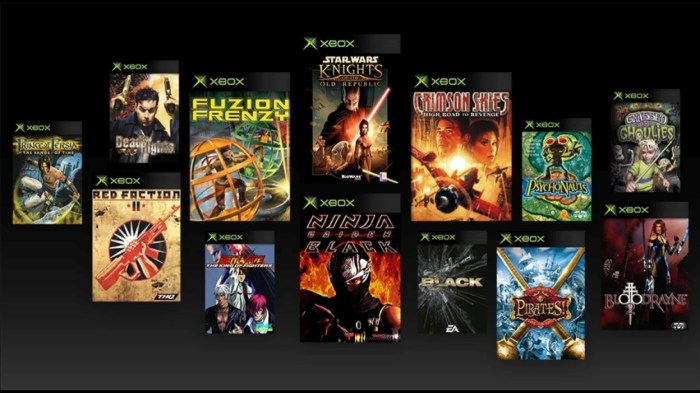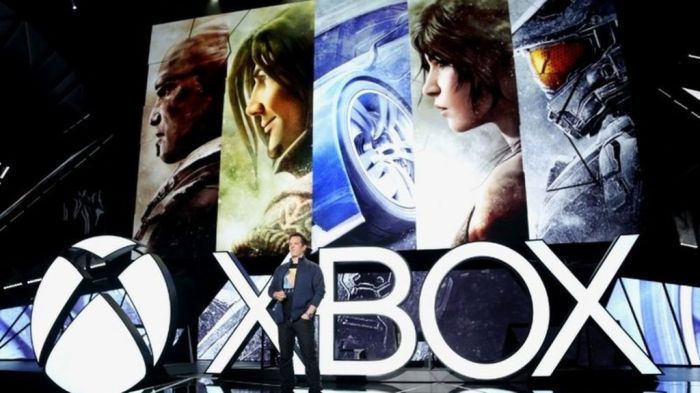Xbox One backward compatibility list expands, bringing a wave of nostalgia and expanded gameplay options to Xbox One users. This latest expansion signifies Microsoft’s commitment to preserving gaming history and enhancing the value of the Xbox One ecosystem. The addition of numerous classic titles allows players to revisit beloved games or experience them for the first time, offering a rich library of entertainment for all tastes.
The expansion is a testament to the power of backward compatibility, allowing players to access a vast library of games spanning generations. This feature not only provides a nostalgic experience but also encourages the preservation of gaming history, ensuring that these titles remain accessible for future generations of gamers.
Xbox One Backward Compatibility Expansion
The Xbox One backward compatibility program has been a major success since its launch in 2015, offering Xbox One owners the ability to play a growing library of Xbox 360 games. This latest expansion adds even more titles to the program, further solidifying its position as a key feature of the Xbox One ecosystem.
Significance of the Expansion
This latest expansion of Xbox One backward compatibility is significant for several reasons. First, it adds a considerable number of new games to the program, expanding the selection available to Xbox One users. This increased selection gives players access to a wider variety of gaming experiences, including classic titles and fan favorites. Second, this expansion highlights Microsoft’s commitment to preserving gaming history. By making these older games playable on modern consoles, Microsoft ensures that these titles remain accessible to a new generation of gamers. This preservation of gaming history is essential for ensuring that the legacy of these games continues. Finally, the expansion further increases the value proposition of the Xbox One console. By providing access to a large library of backward compatible games, Microsoft makes the Xbox One a more attractive option for gamers who value a wide range of gaming experiences.
Notable Additions to the Backward Compatibility List: Xbox One Backward Compatibility List Expands

The Xbox One Backward Compatibility program continues to grow, with new titles being added regularly. This expansion allows players to revisit classic Xbox 360 games on their Xbox One and Xbox Series X|S consoles, offering a wealth of gaming experiences.
Recent Additions
The Backward Compatibility list has seen some notable additions in recent months, including titles that were previously unavailable or highly sought-after. These additions showcase the continued commitment to expanding the program and providing players with access to a wider range of games.
| Game | Release Date | Genre | Description |
|---|---|---|---|
| Fable II | October 2008 | Action RPG | A captivating adventure that combines a rich story with engaging combat and character customization. Fable II allows players to make choices that impact the world and its inhabitants, creating a unique and memorable experience. |
| Alan Wake | May 2010 | Survival Horror | A psychological thriller that blends elements of horror and action. Alan Wake follows a novelist who finds himself trapped in a mysterious town where darkness and supernatural forces threaten his sanity. |
| The Witcher 2: Assassins of Kings | May 2011 | Action RPG | A critically acclaimed RPG that features a complex narrative, branching storylines, and intense combat. The Witcher 2: Assassins of Kings offers players a rich and immersive world to explore. |
| Lost Odyssey | December 2007 | JRPG | A captivating JRPG that features a deep and emotional story, turn-based combat, and a unique “Thousand Year” system that allows players to learn about the past lives of their characters. |
Impact on the Gaming Community

The expansion of Xbox One backward compatibility has generated a mixed response from the gaming community. While many players have welcomed the addition of new titles, some have expressed disappointment about the lack of certain games or features.
The addition of backward compatibility has allowed players to revisit classic titles, experience games they missed the first time around, and even play games they may have never been able to access before. This has led to a resurgence of interest in older games, with many players streaming their gameplay online and sharing their experiences with others.
Player Engagement with Newly Added Games
The inclusion of backward compatibility has provided players with various ways to engage with newly added games. Here are some examples:
- Players who missed out on playing classic titles during their initial release can now experience them for the first time. For instance, the addition of “Halo 3” to the backward compatibility list has allowed a new generation of players to experience the iconic game.
- Players who enjoyed these games during their initial release can revisit them with enhanced features, such as improved frame rates and resolutions, making the experience more immersive.
- The addition of backward compatibility has also encouraged players to stream their gameplay online, sharing their experiences with others and creating a sense of community around these games. This has been particularly evident for games like “Fable II” and “Mass Effect 2,” which have seen a resurgence in popularity thanks to backward compatibility.
Potential Impact on Xbox One Console Sales and Platform Popularity
The expansion of backward compatibility has the potential to impact the sales of Xbox One consoles and the overall popularity of the platform in several ways:
- It can attract new players who may be interested in playing classic Xbox 360 titles, especially those who may not have owned an Xbox 360 console previously. This can lead to increased sales of Xbox One consoles, as players look for a way to access these games.
- It can also encourage existing Xbox 360 owners to upgrade to an Xbox One, giving them access to a wider library of games and features. This can help to increase the overall popularity of the Xbox One platform.
- Furthermore, the addition of backward compatibility can help to differentiate the Xbox One from its competitors, particularly the PlayStation 4, which does not offer the same level of backward compatibility. This can help to attract players who value the ability to play older games on their current console.
Future of Xbox Backward Compatibility
The expansion of Xbox backward compatibility has opened a world of possibilities for gamers, but its future is intertwined with the evolving landscape of gaming. As cloud gaming and subscription services gain prominence, the direction of backward compatibility becomes a fascinating subject to explore.
Backward Compatibility on Future Consoles, Xbox one backward compatibility list expands
The potential for backward compatibility to extend to future Xbox consoles is a compelling topic. Microsoft has consistently demonstrated its commitment to backward compatibility, making it a core feature of its gaming ecosystem. However, achieving backward compatibility across generations presents several challenges.
- Hardware Differences: Each new console generation brings significant hardware advancements, from processors to graphics capabilities. Emulating older games on newer hardware can be complex, requiring extensive optimization and resources.
- Software Compatibility: Older games may rely on specific software libraries or operating system versions that are not compatible with newer consoles. This necessitates extensive work to ensure compatibility, which can be time-consuming and resource-intensive.
- Licensing and Rights: Securing the necessary licenses and rights to include older games in backward compatibility programs can be a hurdle. Developers or publishers may have specific agreements that need to be renegotiated, which can add complexity and cost.
Despite these challenges, the benefits of backward compatibility are undeniable. It provides players with access to a vast library of games, fosters a sense of continuity across generations, and encourages the preservation of gaming history. Microsoft’s commitment to backward compatibility suggests that it will continue to explore ways to make it a core feature of its future consoles.
Expanding the Backward Compatibility List
Adding more games to the backward compatibility list is a constant endeavor for Microsoft. Several factors influence the decision to include a specific game:
- Popularity and Demand: Games that are highly sought after by players and have a significant community are more likely to be added. Microsoft often takes into account fan requests and community feedback when making decisions.
- Technical Feasibility: Not all games are easily emulated on newer consoles. Games that require significant technical work to achieve compatibility, such as those with complex graphics engines or unique hardware requirements, may be less likely to be added.
- Licensing Agreements: As mentioned earlier, securing the necessary licenses and rights from developers or publishers is essential for adding games to the backward compatibility list. Negotiations and agreements can influence the availability of specific titles.
Microsoft’s approach to backward compatibility is likely to evolve as the gaming landscape changes. The company’s commitment to this feature, combined with the increasing importance of cloud gaming and subscription services, suggests that backward compatibility will continue to play a significant role in the future of Xbox gaming.
The expansion of Xbox One backward compatibility is a significant milestone for the platform, demonstrating Microsoft’s dedication to providing players with a diverse and enriching gaming experience. As the future of gaming evolves, backward compatibility remains a crucial aspect of preserving gaming history and ensuring that players can access a vast library of titles across generations. This expansion is a testament to the power of backward compatibility and its potential to shape the future of gaming, offering players a chance to revisit classics or experience them for the first time.
The Xbox One backward compatibility list is expanding, giving gamers access to a wider selection of titles from previous generations. This echoes a similar move by Samsung, which has brought its own internet browser to older handsets , ensuring continued functionality for older devices. This approach, focused on extending the lifespan of existing hardware, is becoming increasingly common across various tech industries.